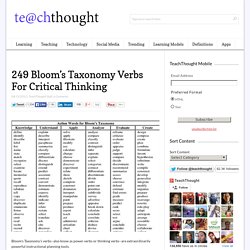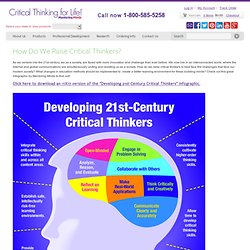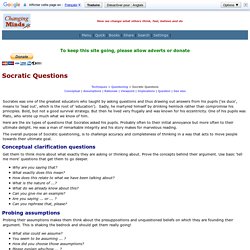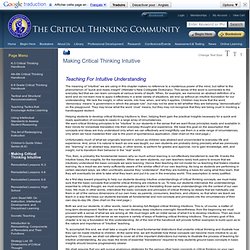

249 Bloom's Taxonomy Verbs For Critical Thinking. Bloom’s Taxonomy’s verbs–also know as power verbs or thinking verbs–are extraordinarily powerful instructional planning tools.

In fact, next to the concept of backwards-design and power standards, they are likely the most useful tool a teacher-as-learning-designer has access to. Why? They can be used for curriculum mapping, assessment design, lesson planning, personalizing and differentiating learning, and almost any other “thing” a teacher–or student–has to do. For example, if a standard asks students to infer and demonstrate an author’s position using evidence from the text, there’s a lot built into that kind of task. First a student has to be able to define what an “author’s position” is and what “evidence from the text” means (Knowledge-level). Though the chart below reads left to right, it’s ideal to imagine it as a kind of incline, with Knowledge at the bottom, and Create at the top. 249 Bloom’s Taxonomy Verbs For Critical Thinking. Developing 21st Century Critical Thinkers. As we venture into the 21st century, we as a society, are faced with more innovation and challenge than ever before.

We now live in an interconnected world, where the Internet and global communications are simultaneously uniting and isolating us as a society. How do we raise critical thinkers to best face the challenges that face our modern society? What changes in education methods should be implemented to create a better learning environment for these budding minds?
Check out this great infographic by Mentoring Minds to find out! Click here to download an 11X17 version of the "Developing 21st-Century Critical Thinkers" infographic. Embed This Image On Your Site (copy code below): <div style="clear:both" _mce_style="clear: both;"><a href=" _mce_href=" align="center" src=" _mce_src=" title="Developing 21st Century Critical Thinkers" width="900" height="5077" border="0" /></a></div><br/><br/><div>Courtesy of: <a href=" _mce_href=" Minds</a></div> Ramsey Musallam: 3 rules to spark learning. Critical thinking web. 6 types of Socratic Questions.
Critical Thinking. Socratic Questioning. Techniques > Questioning > Socratic Questions Conceptual | Assumptions | Rationale | Viewpoint | Implications | Question | See also Socrates was one of the greatest educators who taught by asking questions and thus drawing out answers from his pupils ('ex duco', means to 'lead out', which is the root of 'education').

Sadly, he martyred himself by drinking hemlock rather than compromise his principles. Bold, but not a good survival strategy. But then he lived very frugally and was known for his eccentricity. Here are the six types of questions that Socrates asked his pupils. The overall purpose of Socratic questioning, is to challenge accuracy and completeness of thinking in a way that acts to move people towards their ultimate goal. Conceptual clarification questions Get them to think more about what exactly they are asking or thinking about. Why are you saying that?
Probing assumptions What else could we assume? Probing rationale, reasons and evidence Why is that happening? See also. Making Critical Thinking Intuitive. Teaching For Intuitive Understanding The meaning of “intuitive” we are using in this chapter makes no reference to a mysterious power of the mind, but rather to the phenomenon of “quick and ready insight” (Webster’s New Collegiate Dictionary).

This sense of the word is connected to the everyday fact that we can learn concepts at various levels of depth. When, for example, we memorize an abstract definition of a word and do not learn how to apply it effectively in a wide variety of situations, we end up without an intuitive foundation for our understanding. We lack the insight, in other words, into how, when, and why it applies. Children may know that the word ‘democracy’ means “a government in which the people rule”, but may not be able to tell whether they are behaving “democratically” on the playground. Unfortunately much of what we originally learned in school as children was abstract and unconnected to everyday life and experience.
Inferences and Assumptions.